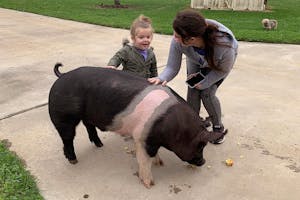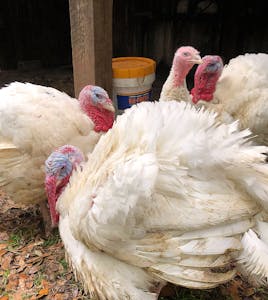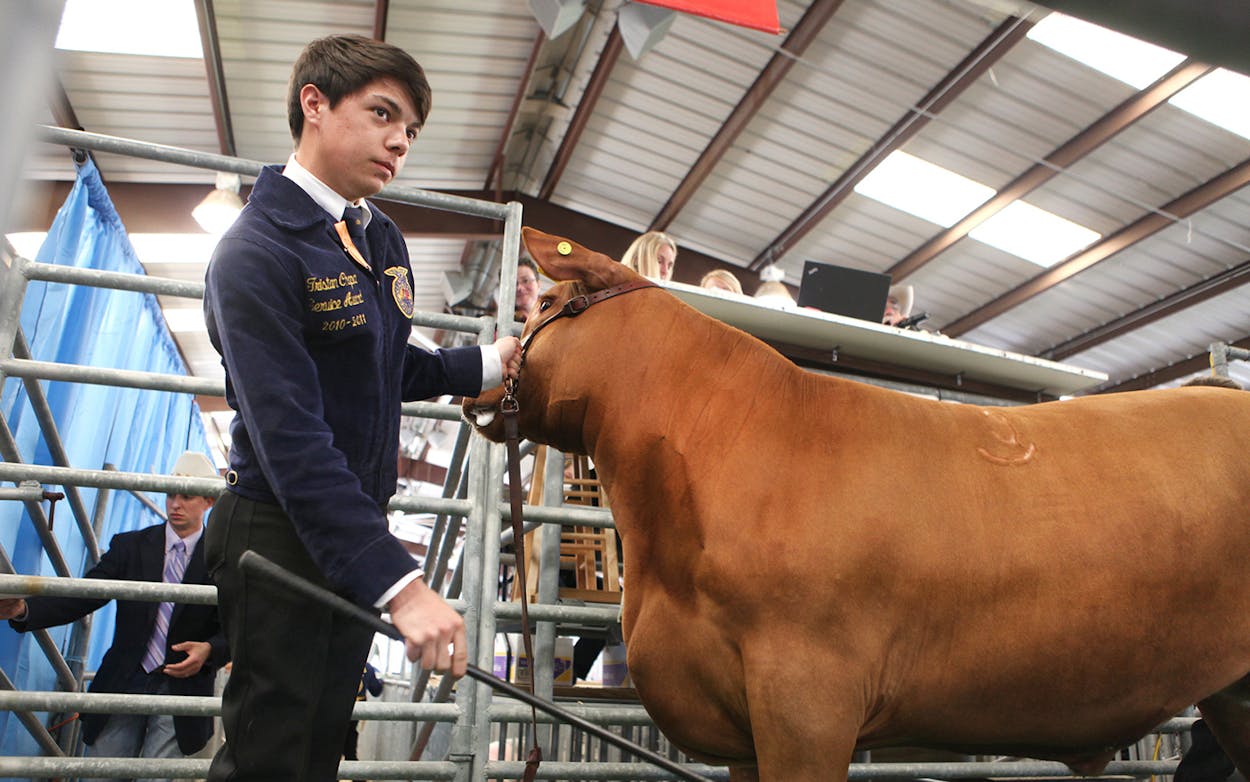Earlier this month, Lauren Cooper and her heifer, Bonnie, were in line to move into their stall at the Houston Livestock Show and Rodeo when news of the event’s cancellation swiftly made its way through the crowd of waiting exhibitors.
Cooper, a senior at Klein High School, was devastated. Her first-ever show heifer, Cricket, gave birth to Bonnie nearly two years ago, and Cooper has spent that time raising the young cow up to show quality. The Houston Rodeo, the largest livestock show in the world, was going to be her last as a junior exhibitor. (She’s been showing for four years.) After hours in line, Cooper and the 1,300-pound Bonnie turned around and headed back home to Spring.
Shortly after the Houston Rodeo was called off due to escalating coronavirus concerns, shows in Austin, Montgomery County, and elsewhere across the state followed with cancellations. As the virus continues to spread around the world, countless events have been canceled and plans have been put on hold—and thousands of Texas students are suddenly at a loss for what to do with the animals they had raised.
Recognizing that junior exhibitors were losing both money and the opportunity to show off their hard work, former FFA and 4-H members and their supporters came together to fill the gap. Through mobilizing online, they managed to put on their own alternative poultry show, buyers and sellers connected on social media, and within a week, one group had managed to both develop and launch an online auction site.
“Everybody is pitching in and pulling the rope in the same direction,” says Brent Graves, a former FFA state officer from Stephenville who helped start the website Stock Show Auctions, along with a group of announcers, agriculture teachers, and friends. “It’s been real cool to watch.”
The website lets students post pictures of their animals, and people can either donate money to support them or buy the animal. Graves partnered with a Texas-based nonprofit, Cowboys 4 Heroes, which buys animals from the Houston Livestock Show to feed veterans, to process donations and dole them out to the junior exhibitors.
Around 20,000 Texas students, ranging from third through twelfth grade, signed up to compete in the Houston Livestock Show and Rodeo this year, according to Joel Cowley, the rodeo’s president and CEO. For many people who raise and show animals, the livestock show is the culmination of their hard work, and they hope it pays off—literally. About 25 percent of the animals that attend the show are put up for auction and are guaranteed to take home significant funds. Within the auction, they can qualify for larger sums, too. The student with the best steer, for example, receives $75,000.
The annual lamb and goat show was the last event held before the Houston Rodeo closed, and the pig, cow, and poultry shows hadn’t yet begun. On Friday and Saturday, the Houston Livestock Show and Rodeo hosted an online auction for preregistered bidders to donate money to support the students who didn’t get to participate this year. While they’re not selling actual animals, the buyers will receive a meat package associated with the species they bid on.
“The idea behind these online auctions is that we want to recognize and support all of these young people who didn’t get a chance to show, including the nonmarket ones,” Cowley says.

If they don’t qualify for auctions in Houston, students who enter lambs, goats, pigs, chickens, and turkeys are required to sell their animals for slaughter at a standard market price.
“There’s a big difference for them between qualifying for the auction, say, with a hog that will receive $1,000 for the lowest placing hog, and not qualifying and having to sell their animal at the floor price, which might be as little as 25 cents a pound,” Cowley says.
With the exception of steers and heifers, students are not allowed to bring their animals home with them after the Houston Livestock Show, which means most weren’t expecting to still have their animals at this point. Now, they have to either sell them to be slaughtered or find them a new home. For some, the second chance at life is a silver lining.
When Chubbs the pig met Emma Hays, the two had an instant connection. Though Emma, twelve, had raised and shown four pigs before then, there was something special about Chubbs. Within days of bringing him home, he started showing his affection for her. “I was on the ground and he was running and jumping, and he jumped in my lap and just sat there,” Emma says. She trained him to walk with his head up by holding a marshmallow in front of him and having him follow it up and down the length of his pen.
When the Houston Livestock Show was canceled, Emma’s mom, April Hays, shared a picture of Chubbs online and asked if anyone was interested in purchasing him. If they didn’t find a buyer, they would have to send him off to be slaughtered.
Luckily, Nancy Murphy stepped in. “Will he be a pet for you?” April asked Murphy. “That would be my daughter’s happy ending to this.” Murphy said yes.
Murphy, sixty, lives in Sealy with her husband and an eclectic collection of animals that includes a small cow who thinks he’s a dog, a mini zebu, three mini donkeys, and five horses.
“I’ve always wanted a pig, but I’ve never actively looked for one,” Murphy says. “I wondered if it was going to scare my horses too much, or would the donkeys be nice to it? Do I really want to rock the boat? Everybody gets along, everybody is happy. But then this situation happened with the kids and I thought, you know what? I’m just going to do it.”
Leading up to the Houston show, Emma was dreading the idea of having to send Chubbs off to be slaughtered.
“She knows the drill, she understands the whole process of it, but she got a little extra attached to this one,” April says. The 270-pound, mostly black pig with a thick pink stripe around his middle arrived in Sealy on Saturday morning and was greeted by Murphy’s grandkids, Tommy and Piper. They kissed him and fed him apples. Murphy’s husband Tom rubbed his belly until he flopped over on his side. “He’s going to have a great life,” Emma says.
Renee Spiller, 59, bought a steer and two pigs from students who posted their animals online. She had been looking to butcher a steer anyway, and figured this was a good way to support the student exhibitors who were suddenly in a bind. Buying the animals was easy—both were delivered to her house within days. But finding someone to process them was more difficult.
The first meat company she called couldn’t get the animals in for processing until August, while others said they maybe could in May. Finally, she found a place in Devine to take them, about three hours away from her home in Eden. “In the end it was costing me $3 per pound,” Spiller says. “Well, you know, crap hamburger meat is $3.69. And you’re not just getting a market steer that ran through the ring, you’re getting one that’s been fed and conditioned to be prime cut beef.”
Kristi Mehrens, a 4-H parent and local leader in Rosharon, said she felt sick to her stomach when she found out the livestock shows in Houston and Austin were canceled. Along with two friends, she organized an alternative poultry show for students showing both turkeys and broilers (chickens bred and raised to be eaten). “At the end of a project, these chickens are like ten pounds or better and they are at the end of their lifespan,” Mehrens says. “They’re going to start dying, so you have to get them shown. Time is of the essence.”

The alternative show was held in Wharton County three days after Houston shut down. The facilities, banners, buckles, and snacks were all donated. Organizers also managed to book the four judges who were set to judge the competition in Houston, as well as the same processor to come and pick up all the birds–all for free. “We have not paid one cent out of pocket,” Mehrens says. “Everything donated goes back to these kids.”
Even with the short notice announcement, 571 students came out to show their birds on Saturday, March 14. Each bird was ranked and processed, just like it would be at a typical livestock show. The group included 77 percent of the turkey exhibitors and 66 percent of the broiler exhibitors that were supposed to show in Houston, according to Mehrens.
“Turkeys eat almost as much as a steer and even though you only have these broilers for about six weeks, it’s a very hard six weeks on these kids,” Mehrens says. “You’ve got to be in that pen every few hours. They can never run out of food, they can never run out of water. You’re always pushing and trying to get them to eat and keep them moving.”
Now, Mehrens is collecting donations through a Facebook group whose goal is to give kids the same amount of prize money Houston would have offered. Though the platform prohibits the sale of animals, she’s also trying to connect the kids who didn’t come to the alternative show with potential buyers. “With grocery stores being out of meat and everything else, it’s really a great opportunity for people to be able to pick up farm-raised fresh chickens that are processed,” Mehrens says.
Monette Shaunty-Barnes, whose son, Jackson Shaunty, seventeen, raised a steer to show in Houston this year, said that one of Jackson’s friends’ fathers reached out to them the day after the rodeo was canceled to offer to purchase his steer. He told Jackson he thought of him immediately, and wanted to help.
“You’re glad you live in Texas for that reason,” Shaunty-Barnes says. “People really do come together.”
As we cover the novel coronavirus in Texas, we’d like to hear from you. Share with us your tips or stories about how the outbreak is affecting you. Email us at [email-hidden].
- More About:
- Business






